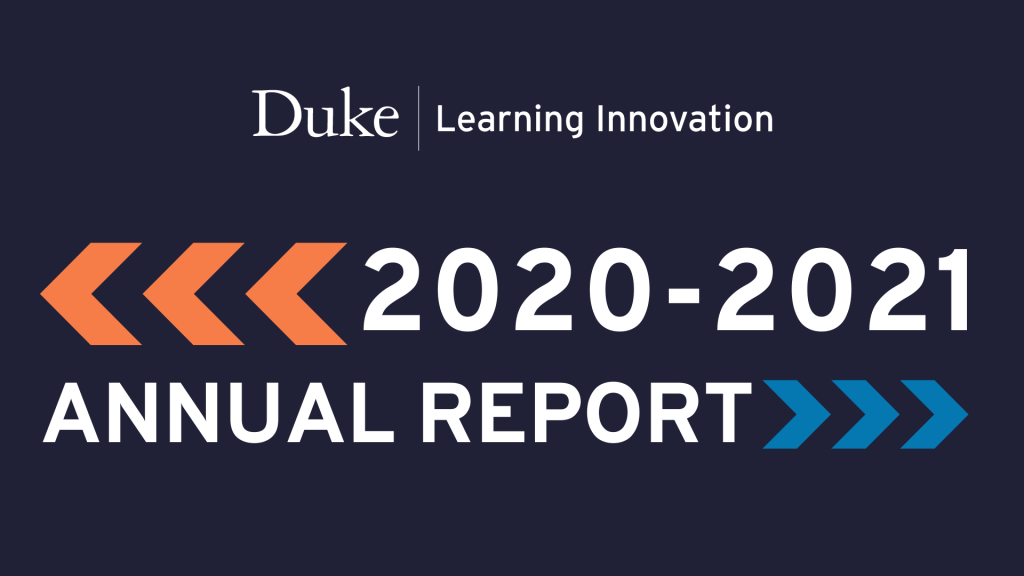
Excerpted from our 2020-2021 Annual Report
We didn’t produce an annual report last year. Annual reports require time to reflect, analyze and celebrate. Having just come off of the emergency remote teaching efforts of Spring 2020, we chose to combat uncertainty and instability with a new long-term strategy for influencing and supporting the overall success of Duke courses during the pandemic – be they online, hybrid, remote, temporarily remote and/or in-person. We called this new effort Flexible Teaching. And though some might have thought that here – one year later in Fall of 2021, those efforts would no longer be necessary, we not only find them to be essential but continue to build upon them. In many ways flexible teaching has become part of the core of who and what Learning Innovation is and does.
Early in the pandemic, Arundhati Roy, in a haunting piece for the Financial Times, wrote: “Historically, pandemics have forced humans to break with the past and imagine their world anew. This one is no different. It is a portal, a gateway between one world and the next. We can choose to walk through it, dragging the carcasses of our prejudice and hatred, our avarice, our data banks and dead ideas, our dead rivers and smoky skies behind us. Or we can walk through lightly, with little luggage, ready to imagine another world. And ready to fight for it.”
I’ve been thinking about this particular point in time now – in 2021: no longer at the beginning of an uncertain future, but not yet truly ‘post-pandemic.’ Not yet. We’ve lost some of the ‘luggage’ Roy alludes to, perhaps even shed some ‘dead ideas’ — but we also have not arrived at a space to breathe; haven’t had enough time to dream a new dream — enough time to “imagine another world.” Not yet.
And yet, we know we will need to dream those new dreams. As Morgan Housel more recently put it, “a seductive belief that exists in almost every field is that things will keep operating like they always have.” And yet – many things have subtly changed seemingly overnight.
Part of the role of an organization like Learning Innovation is to continue to help the institution transform to better meet its educational mission and goals. Some see innovation as purely disruptive, and surely, sometimes it is. But most of the time, with regards to teaching and learning – even digital learning – innovation is an incremental process. Like learning itself — a continual process of discovery, reflection, adaptation. We are constantly improving, constantly striving — but we haven’t arrived. Not yet.
With that said, I’m immensely proud of the Learning Innovation team – not only this year, but throughout all of this time traveling through the ‘pandemic portal’ together.
- Through our Flexible Teaching efforts, we had an impact on more faculty and students than we’ve ever had in our entire history as Learning Innovation (or our previous incarnation as the Center for Instructional Technology).
- Our work has put a renewed focus on student and faculty well-being. We revised our mission and goals to better reflect our values of diversity, equity, inclusion and accessibility, and offered workshops and new resources focused on creating inclusive and equitable classes.
- My friend and former colleague Matthew Rascoff, then in his capacity as Duke’s Associate Vice Provost for Digital Education and Innovation, nudged Coursera to step in and share their immense catalog of online courses with more of the world as part of what would become known as the Coronavirus Response Initiative. Duke has continued to benefit from this arrangement as we now provide the Duke community with free access to over 2,000 courses offered by nearly 100 Coursera partner institutions.
- Through the Pandemic Pedagogy Research Symposium we convened a virtual gathering of over 700 faculty, researchers and other scholars and practitioners to share new and emerging research related to teaching and learning during the pandemic.
- Closer to home, we launched Carry the Innovation Forward — a new program designed to sustain the digital learning innovations that arose during the COVID-19 pandemic at Duke.
- To better address an emerging need in our learning technology ecosystem, we initiated a unique collaboration between Learning Innovation, OIT and Longsight (our partners who host Duke Sakai) to create Sakai Conversations, a new tool that supports a variety of conversation types in classes.
- Amazingly, and yet perhaps unsurprisingly, our ‘regular’ work continued as well, despite our extended pandemic-related efforts. For example, we launched several new experiments in online learning, continuing to seed innovation with our schools and programs. In addition, we supported graduate student training, partnered with Bass Connections, made countless improvements to our learning technologies, published more research on teaching and learning and more.
Finally a word about the folks on the Learning Innovation team. Like many teams at Duke, we’ve now lived a ‘shared experience.’ Our experience had us often edging pretty close to the tip of burnout, but then always regrouping and pulling back together as a team. This team wasn’t afraid of the unknown, or the seemingly insurmountable. We kept our humor and good spirits even as we had to pause and mourn over situations with friends, family, or the current state of the world. We remained gracious and dare I say, loving, to each other – and others beyond our own team, even under pressure.
As a unit, we continue to be engaged in a long term process of pedagogical and digital transformation, situated in a world of rapidly shifting social, economic and political change. Not all of that transformation is – or will be – positive, but we remain hopeful for the future, ready to gather with our Duke friends and colleagues again to ‘imagine another world’ even if we realize that we haven’t perhaps passed fully through the other end of Roy’s portal. Not yet.
Shawn Miller
Director of Duke Learning Innovation
